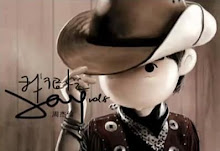Asian Fanatic
****
Group: AF-newbie
http://www.taipeitimes.com/News/taiwan/arc...2/08/2003430567
By Ho Yi
STAFF REPORTER
At the Golden Horse Awards (金馬獎) on Saturday night, Taiwanese cinema seemed ready to celebrate an early victory as local productions dominated in almost all the categories that had Taiwanese nominees. Cape No. 7 (海角七號) was undoubtedly leading the way.
The film ended up taking home top honors in five categories, including best supporting actor and outstanding Taiwanese film of the year.
But things took an unexpected turn 10 minutes before the ceremony ended, with Hong Kong’s Peter Ho-Sun Chan (陳可辛) and his big-budget costume drama The Warlords (投名狀) walking away with awards for best feature film and best director.
BASICS
The Taipei Times caught a few jury members and festival chairwoman Peggy Chiao (焦雄屏) at the after-party and asked them their views on this year’s Golden Horse.
“I think before we can talk about the award result, we should first have the jury system under review,” said Wang Keng-yu (王耿瑜), a film producer, film and music festival curator.
The judging process is divided into two stages: the preliminary, with 20 judges, and the final, with seven. In the first stage, discussions and meetings were broken into groups because each member of the jury is responsible for the nominations in several award categories, rather than all the jurors working together.
“As a result, the nomination list is not a general agreement among all jury members but a consensus within the groups,” Wang sad. “We turned in our grades and read the nomination list on the newspaper.”
“The final scores are reached combining the grades we made and those made by the jury in the second stage. None of the jury members knew the results before they were announced,” Wang said. “It’s a consensus all right. But is it a fair and credible consensus? There is still room for improvement.”
Wu Mi-sen (吳米森), a film director, said that Taiwanese movies had done well.
“As a jury member, I felt no pressure to be patriotic this year. I cast each vote with confidence and assurance, knowing that I wasn’t rooting for the film just because it was made in Taiwan.”
“Personally, I think Kelly Lin (林熙蕾) and Takeshi Kaneshiro (金城武) have made great progress — from pretty-faced pop-idols to serious actors. Their works haven’t been recognized partially because people still see them as idols rather than actors,” he said.
Chang Chang-yen (張昌彥), a veteran film critic and scholar, said: “As a juror in the first stage, I am not satisfied with the results. Many Taiwanese movies were left out.”
“As far as the jury system goes, there is still a lot of room for improvement. Unlike the Oscars, which have 3,000 film professionals at its disposal, there are only 30 of us, so that each member is assigned to a certain number of award categories,” he said. “It causes problems when, say, a cinematographer needs to be the judge for editing or a specialized field he or she is not familiar with. It can easily lead to a situation where the one who knows the field leads the discussion and forms a consensus.”
BATTLE
Chiao said that the competition in the best feature film and best director categories was a battle between film industries.
“Behind the productions from Hong Kong and China are colossal amounts of money, rich resources and mega stars. Taiwanese movies are comparatively low-budget and human drama-driven. We may yet grow stronger in the industry contest. But this year’s Taiwanese films definitely surpassed others in content and artistry,” Chiao said.
In related news, some Internet users in Taiwan said they were irritated by Chan’s remark that Cape No. 7 was the “hope for Chinese movie industry.”
“I don’t have much to say about the results, but I have something to say to director Peter Chan,” Internet user “Asmmilk” posted. “Sorry, but Cape No. 7 is not a Chinese movie.”
However, an Internet user nicknamed “Perry680606” defended Chan, saying in a posting that Chan probably didn’t do it on purpose.
“He has long been making movies in China, so it would be reasonable that he just used the phrase ‘Chinese movie’ without even thinking about it,” he wrote..
The winners of the 45th annual Golden Horse Film Awards:
BEST PICTURE:
The Warlords (投名狀)
BEST DIRECTOR:
Peter Chan Ho-sun (陳可辛)
(The Warlords)
BEST LEADING ACTOR:
Zhang Hanyu (張涵予)
(Assembly, 集結號 )
BEST LEADING ACTRESS:
Prudence Liew (劉美君)
(True Women for Sale, 我不賣身.我賣子宮)
BEST SUPPORTING ACTOR:
Ma Ju-long (馬如龍)
(Cape No. 7, 海角七號)
BEST SUPPORTING ACTRESS:
Mei Fang (梅芳)
(Orz Boyz,囧男孩)
Best New
PERFORMER:
Suming Chiang (姜聖明)
(Hopscotch, 跳格子 )
BEST ORIGINAL SCREENPLAY:
Tsai Tsung-han (蔡宗翰),
Tom Lin (林書宇)
(Winds of September, 九降風)
Best Screenplay
ADAPTATION:
Liu Heng (劉恆)
(Assembly)
BEST VISUAL EFFECTS:
Ng Yuen-fai (吳炫輝),
Chau Chi-shing (鄒志盛),
Tracy Kok (郭惠玲) (The Warlords)
BEST ART DIRECTION:
Chao Shih-hao (趙思豪)
(Parking, 停車)
BEST MAKE UP & COSTUME DESIGN:
Luke Huang (黃育男),
Sai Com (康俊偉)
(Candy Rain, 花吃了那女孩)
BEST ACTION CHOREOGRAPHY:
Li Chung-chi (李忠志)
(Connected, 保持通話)
BEST ORIGINAL FILM SCORE:
Fred Lu (呂聖斐), Lo Chi-yi (駱集益) (Cape No. 7)
BEST ORIGINAL FILM SONG:
Southern Country (國境之南)
(Cape No. 7)
OUTSTANDING TAIWANESE FILMMAKER OF THE YEAR:
Wei Te-sheng (魏德聖)
(Cape No.7)
BEST FILM EDITING:
Yau Chi-wai (邱志偉)
(Connected)
BEST CINEMATOGRAPHY:
Cheng Siu-keung (鄭兆強)
(Sparrow, 文雀)
BEST SOUND EFFECTS:
Steve Burgess (Missing, 謎屍)
BEST DOCUMENTARY:
Up the Yangtze (Canada)
BEST SHORT FILM:
Hopscotch (Taiwan)
OUTSTANDING TAIWANESE FILM OF THE YEAR:
(Cape No. 7)
LIFETIME ACHIEVEMENT AWARD:
Chang Feng (常楓)
SPECIAL CONTRIBUTION AWARD:
Huang Ren (黃仁)
Tuesday, December 9, 2008
Jurors criticize Golden Horse voting system
Subscribe to:
Post Comments (Atom)

1 comment:
hey can translate the news from http://blog.omy.sg/she911/about ?
Post a Comment